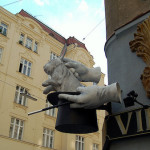We run our website the way we wished the whole internet worked: we provide high quality original content with no ads. We are funded solely by your direct support. Please consider supporting this project.

The Problem with Naming People’s Sin
Jesus told a woman caught in adultery: “Go and sin no more” (John 8:11). Since Jesus said this, does this give the church the right to tell people not to sin?
It’s one thing for Jesus, who “knew no sin” to say this and quite another for people like us—with tree trunks protruding out of our eyes—to say the same thing. The central point of the story where Jesus says these words is that none of her accusers were in a position to judge her. Jesus invited whoever was without sin to cast the first stone, but no one met that requirement. They were as much sinners as she.
Jesus, the only one who was qualified to condemn the woman, did not do so. Rather he told her to abstain from this sinful activity.
Here’s the lesson: if you want to judge someone else, you first have to be sinless. But if you are sinless, like Jesus, you won’t have any inclination to do so.
But what about the time that Jesus told the Samaritan woman that she had five husbands and was living with a man who was not her husband (John 4:16-18)? Doesn’t this mean that Jesus was setting a model for naming people’s sins?
Jesus didn’t mention this information to judge this woman. The only reason he let this woman know that he was aware of her past was to convince her that he was the Messiah. If this woman would “drink” the water he had to offer she would never thirst again. Even though he knew about her past, the offer of “life” was still on the table, no questions asked!
Had there been any shame or judgment involved, meeting a man who knew everything about her would hardly have been a joyful encounter. However, she went back to her town and joyfully proclaimed what she had heard.
Jesus did not try to fix people’s moral lives. He loved people and offered them everlasting life as they are, regardless of their moral lives. Whatever transforming impact God’s love has on people, it has incredible power because it is given before—and apart from—the transformation itself.
This is how we are called to love. We are to be the shadow that Jesus casts—to imitate God by “living in love, as Christ loved us and gave himself for us (Eph 5:2). We are to demonstrate the kingdom of Calvary-like acts of service and then proclaim the message of God’s kingdom.
We are to serve, no questions asked. We are to love before they are transformed—even our enemies—with a nonjudgmental love to all who are thirsty. To do this we must refrain from doing what Jesus never did: namely positioning ourselves as wiser, morally superior, or the “fixer” of others.
—Adapted from The Myth of a Christian Nation, pages 130-132
Related Reading

Sinful Nature and Free Will
Q: If our sinful nature is what causes us to sin/reject God, can we be held responsible for our sins, when this nature resulted from Adam and Eve’s sin? Do we really have the freedom to either choose/reject God if our sinful nature compels us to reject God? On the other hand, if our sinful…

Generous Grace
Michelle Brea via Compfight Mark McIntyre wrote a piece on his blog called Selective Grace that highlights the ways in which the church tends to more easily demonstrate grace with some than with others. It’s a call to a more generous grace that does not distinguish between particular sins or particular differences in belief. How…

Cruciform Aikido Pt 2: God-Forsaken Judgment
So if Jesus is the supreme revelation of what God is like, as we explained in our last post, what does that tell us about the nature of God’s judgment?
As Jesus was dying on the cross he cried out, “Eli, Eli, lema sabachthani?,” which means, “My God, my God, why have you forsaken me?” (Mt. 27:46). This shocking cry reveals…

The Flesh: 4 Things to Know
The New Testament contrasts “life in the Spirit” with “life in the flesh” (see Gal 5:16-20). In some translations, the word for “flesh” (sarx, in the Greek) is translated as “sinful nature” as if one’s identity, or who we are in our essential being, is sinful. However, such a view of the flesh denies that…

Living Jesus’ Prayer for Forgiveness
Luke 23:34: Jesus said, “Father, forgive them, for they do not know what they are doing.” Could anything be more shocking and yet more beautiful than this prayer? After being whipped, beaten, crowned with thorns, repeatedly mocked, spit upon, sneered at, and pierced with spikes through his wrists and ankles, while slowly suffocating as he…

Faith or Magic?
Many Christians today treat faith like magic. While the content of what Christians believe is obviously different from pagan practitioners of magic, the way they believe and the motive they have for believing, seems to be very similar. Magic is generally understood to involve people engaging in special behaviors that empower them to gain favor…
